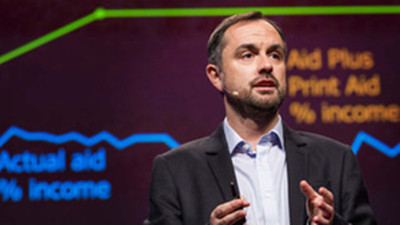I study the behavior of investors,how they react to policy and the economy.
我研究投資者的行為,研究他們?nèi)绾螒?yīng)對(duì)政策和經(jīng)濟(jì)。
It gives me a different angle on the aid issue.
這在救助問(wèn)題上給我新的啟迪。
But it took an innocent question from my then-four-year-old daughter to make me appreciate that.
但是當(dāng)時(shí)我年僅四歲的女兒?jiǎn)柕囊粋€(gè)童真的問(wèn)題讓我對(duì)此心有感激。
Pia and I were on the way to a local cafe and we passed a man collecting for charity.
當(dāng)時(shí)皮婭和我正在去當(dāng)?shù)匾患铱Х葟d的路上我們經(jīng)過(guò)了一個(gè)為慈善募捐的男人身邊。

I didn't have any change to give him,and she was disappointed.
我當(dāng)時(shí)沒(méi)有給他零錢(qián),她就有些失望了。
Once in the cafe, Pia takes out her coloring book and starts scribbling.
到了咖啡廳, 皮婭拿出她的圖畫(huà)本開(kāi)始涂畫(huà)。
After a little while, I ask her what she's doing,and she shows me a drawing of a 5 note to give to the man outside.
過(guò)了一會(huì)兒, 我問(wèn)她在干什么,她給我看了她畫(huà)的一張5歐元的鈔票要給外面的那個(gè)男子。
It's so sweet,and more generous than Dad would have been.
非常溫馨,遠(yuǎn)比她爸爸要慷慨得多。
But of course I explained to her,you can't do that; it's not allowed.
當(dāng)然我跟她解釋?zhuān)悴荒苓@么做,這行不通得。
To which I get the classic four-year-old response:
結(jié)果我得到的是四歲小孩經(jīng)典的回答:
Why not?
為什么啊?
Now I'm excited, because I actually think I can answer this time.
現(xiàn)在我有點(diǎn)激動(dòng)了, 因?yàn)槲矣X(jué)得我現(xiàn)在可以回答這個(gè)問(wèn)題了。
So I launch into an explanation of how an unlimited supply of money chasing a limited number of goods sends prices to the moon.
所以我開(kāi)始解釋無(wú)限量供應(yīng)的貨幣去購(gòu)買(mǎi)限量供應(yīng)的商品,是會(huì)把價(jià)格抬高到離譜的地步的。
Something about that exchange stuck with me,not because of the look of relief on Pia's face when I finally finished, but because it related to the sanctity of the money supply,a sanctity that had been challenged and questioned by the reaction of central banks to the financial crisis.
這次的交流讓我久久不能忘懷,并不是因?yàn)樵谖铱煲Y(jié)束的時(shí)候皮婭臉上露出安心的表情,而是因?yàn)樗婕暗截泿殴?yīng)的神圣性,這種神圣性一直被中央銀行對(duì)財(cái)政危機(jī)的反應(yīng)所挑戰(zhàn)和質(zhì)疑。
To reassure investors,central banks began buying assets to try and encourage investors to do the same.
為了使投資方安心,中央銀行開(kāi)始購(gòu)置資產(chǎn)嘗試鼓勵(lì)投資者也這么做。
They funded these purchases with money they created themselves.
他們用他們自己造出來(lái)的錢(qián)去投資這些購(gòu)置。
The money wasn't actually physically printed.
而這些錢(qián)并沒(méi)有真正被印刷出來(lái)。
It's still sort of locked away in the banking system today.
在今天這筆錢(qián)仍處于被鎖在銀行系統(tǒng)的狀態(tài)。
But the amount created was unprecedented.
但造出來(lái)的這筆錢(qián)的數(shù)量卻是空前的。
Together, the central banks of the U.S.,U.K and Japan increased the stock of money in their economies by 3.7 trillion dollars.
各國(guó)的中央銀行,美國(guó),英國(guó)和日本都一起增加了各自經(jīng)濟(jì)的貨幣存量增加了3.7萬(wàn)億美金 (人民幣約22.2萬(wàn)億元)。
That's three times, in fact that's more than three times,the total physical stock of dollar notes in circulation.
這是三倍,其實(shí)不止三倍,實(shí)際流通中的美金貨幣存量總和。
Three times!
三倍啊!
Before the crisis,this would have been utterly unthinkable,yet it was accepted remarkably quickly.
在經(jīng)濟(jì)危機(jī)之前,這是完全不能想像的,但它還是非常快就被接受了。
The price of gold,an asset thought to protect against inflation,did jump,but investors bought other assets that offered little protection from inflation.
黃金的價(jià)格,黃金是被當(dāng)作用來(lái)抵御通貨膨脹的確實(shí)下跌了,但投資者購(gòu)買(mǎi)了其他的資產(chǎn),而這些資產(chǎn)卻基本無(wú)法抵制通貨膨脹。
They bought fixed income securities, bonds.
他們購(gòu)買(mǎi)固定收益證券,債券。
They bought equities too.
他們也買(mǎi)普通股。
For all the scare stories,the actual actions of investors spoke of rapid acceptance and confidence.
對(duì)于那些嚇人的報(bào)道,投資者真正的行為顯示出快速的接受和信心。
That confidence was based on two pillars.
這種信心建立在兩個(gè)支柱上。
The first was that, after years of keeping inflation under control,central banks were trusted to take the money-printing away if inflation became a threat.
第一個(gè)就是在控制通貨膨脹的多年后,中央銀行被人們所信任,如果通貨膨脹構(gòu)成威脅時(shí)他們可以停止鈔票的印刷。



